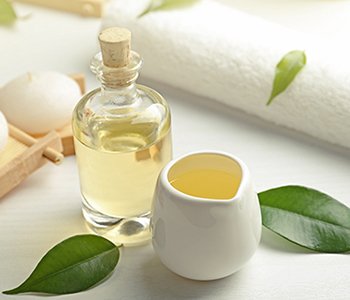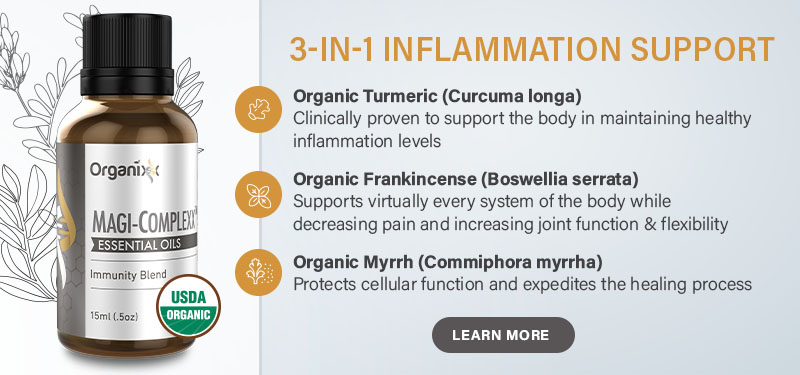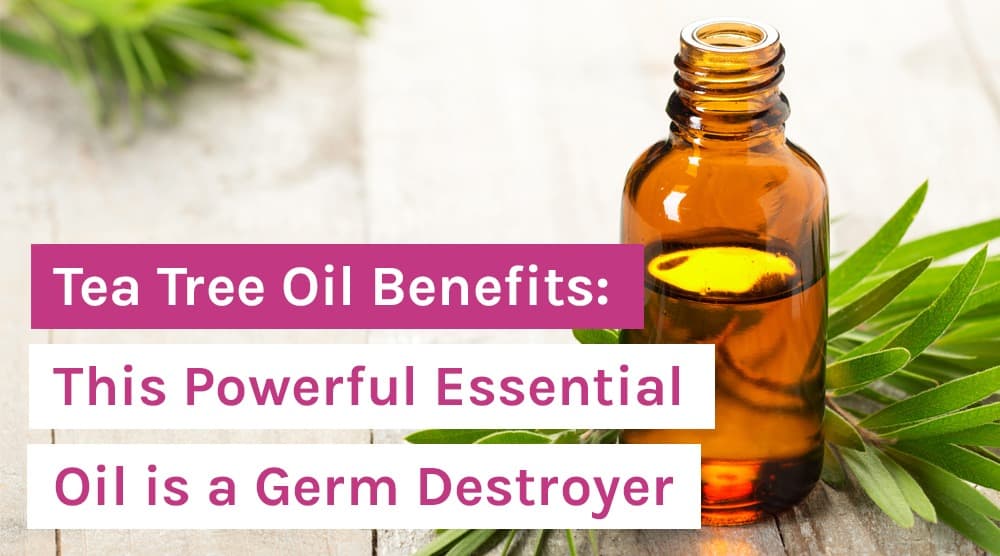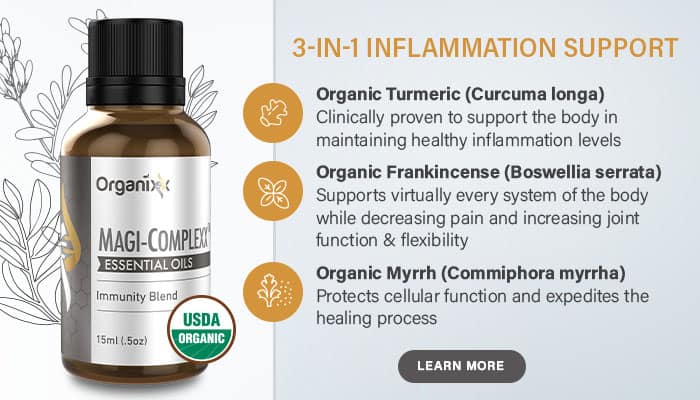Tea Tree Oil Benefits: This Powerful Essential Oil is a Germ Destroyer
In a hurry? Click here to read the Article Summary...
Picture this… you’ve just spent several weeks sailing southward on the open seas from England when you finally spot new land somewhere in the South Pacific. As you set down amidst striking white cliffs surrounded by emerald blue waters, you’re greeted by friendly locals who take you along the coastline to see the area’s many breathtaking sights.
During this trek you spot something particularly interesting: tall, wispy trees with sticky, aromatic leaves that you’re told possess miraculous healing qualities.
Intrigued by this, you decide to boil these leaves into a tea for you and your worn-out crew to see if there’s any merit to the hype. Lo and behold, just a few minutes later you feel cleansed, soothed, and rejuvenated. You decide to honor this tree from which these amazing leaves were plucked by suitably naming it a “tea tree.” The rest, as they say, is history and the start of the world’s love affair with the “tea tree” and its tea tree oil benefits.
This curious little story might sound like some kind of fantasy fiction, but it reportedly happened back in 1770. The main character was Captain James Cook of circumnavigation fame.
Captain Cook is the man who, besides the aborigines in Australia where he landed, is said to be the first to discover the allure of the tea tree. He’s also said to have named the tree as such, although its official scientific name is Melaleuca alternifolia. And since the time of Captain Cook, the oil of tea tree (melaleuca oil) has lived on as one of the world’s most prized botanical therapeutics, for the reasons you’re about to discover.
Tea Tree Oil Benefits: From Antiquity to Modernity
 Though the history books credit Captain Cook as being the tea tree pioneer, the healing potential of this amazing plant was actually known long before he ever even arrived “down under.”
Though the history books credit Captain Cook as being the tea tree pioneer, the healing potential of this amazing plant was actually known long before he ever even arrived “down under.”
Some of the earliest historical accounts of indigenous Australian people groups suggest that tea tree leaves were commonly use in poultices to treat wounds and prevent infections. This tradition was carried forward as science uncovered tea tree oil’s incredible antiseptic, antibacterial, antifungal, anti-inflammatory, and antiviral properties [1].
The earliest official recognition of tea tree oil as a botanical medicine occurred in the 1920s when it was described in the scientific literature as being a powerful germicide when used topically. Its popularity quickly soared, and the oil spread throughout Europe over the following decade. Eventually tea tree oil received its own monograph that was published by the World Health Organization (WHO), the British Pharmacopoeia, The Pharmaceutical Society of Great Britain, and the European Society for Cognitive Psychology (ESCOP).
An early 20th century study published in the British Medical Journal cites tea tree oil as “a powerful disinfectant [that] is non-poisonous and gentle” to the body. During World War II, Australian soldiers used tea tree oil as a go-to antiseptic remedy in their first aid kits.
More recently in 2007, the Australian Tea Tree Industry Association (ATTIA), an agency of the Australian government, published a comprehensive dossier outlining a plethora of more recent science backing tea tree oil’s many therapeutic uses.
Listed in this dossier are the impressive results of numerous human clinical trials showing tea tree oil benefits. Melaleuca (tea tree) may provide support to the body in the following ways [2]:
- Fighting harmful bacteria, including “superbugs” like methicillin-resistant Staphylococcus aureus (MRSA)
- Targeting viruses, including persistent viral infections like herpes labialis (cold sores and fever blisters)
- Treating yeast and fungal infections like tinea pedis (ringworm), tinea unguium (a fungal infections of the nails), and candidiasis (candida)
- Fighting acne vulgaris, a common skin condition
- Eliminating dandruff
- Preventing head lice
- Clearing gingivitis, denture stomatitis, and other forms of oral infection
Furthermore, the results of a study recently issued by Australia’s Rural Industries Research and Development Corporation (RIRDC) suggest that tea tree oil may even be an effective remedy for more serious conditions like skin cancer.
In conjunction with the University of Western Australia (UWA), Australian government researchers examined the topical use of tea tree oil in mouse models and found that it may, in fact, be a potent anti-tumor agent.
“We’ve known for a long time that tea tree oil has recognized health benefits, particularly its role in combating bacteria, fungi, and viruses,” stated Dr. Sara Greay from UWA about these groundbreaking results. Dr. Greay and her team found that just four days of topical treatment with tea tree oil was enough to promote significant tumour growth inhibition in cancerous mice.
Although we and others have reported anti-cancer activity of tea tree oil against cells in vitro, no study has ever reported anti-tumour efficacy of tea tree oil in a preclinical cancer setting…so what this new research tells us is that tea tree oil, in the right formulation, may also play a role as a clinically effective topical treatment for skin cancer in humans [3].”
How People Are Using Tea Tree Oil Today
 All of this scientific research into tea tree oil’s many potential benefits for humans is both impressive and ongoing. Its use is widespread and ever-growing as a result, with tea tree oil now being incorporated into an expanding array of consumer products.
All of this scientific research into tea tree oil’s many potential benefits for humans is both impressive and ongoing. Its use is widespread and ever-growing as a result, with tea tree oil now being incorporated into an expanding array of consumer products.
These include moisturizers, body lotions, shampoos and conditioners, toothpastes, hand washes, face-cleansing washes, soaps, foot sprays, foot powders, shaving products, post-waxing treatments, and deodorants.
Pure tea tree oil is also a popular choice for many people who choose to make their own care and cleaning products at home without harsh chemicals.
For simple at-home applications, pure tea tree oil can be applied to bandages and gauze strips, for instance, to support rapid wound healing without infection. Some people mix it with carrier oils like coconut, jojoba, olive, and argan and apply it directly to itchy or inflamed skin as well, since studies show that it helps to minimize histamine reactions [4].
For people with acne, tea tree oil is often a preferable alternative to benzoyl peroxide because it’s been known to work similarly without causing harmful side effects [5].
In hospitals, tea tree oil is commonly used to sanitize surfaces that may be lurking with MRSA or other dangerous “superbugs” like “golden staph” that could harm patients.
A clinical trial that took place at Westmead Hospital in Sydney, Australia, even found that a simple tea tree oil body wash was highly effective at eradicating golden staph from patients’ bodies, prompting the study’s lead author to declare it a “suitable” natural treatment for superbugs [6].
Watch this video to discover the top 10 health benefits of tea tree oil, and find out the startling and little-known facts about how essential oils really ARE essential for your health.
Tea Tree for Respiratory Support
Another tea tree oil benefit is that it can be diffused as aromatherapy to help support the immune and respiratory systems. Using it this way, as well as topically, may support or even replace the use of conventional antibiotics to address infections.
Evidence of this is presented in a 2004 study published in the Journal of Hospital Infection, demonstrating how tea tree oil has the potential to help mitigate the growing problem of antibiotic resistance that’s sweeping the globe [7].
Similarly, tea tree oil can help purify the air you breathe inside your home or workplace. Scientific evidence suggests that diffusing tea tree oil can help kill molds and other types of harmful pathogens that might be lurking in furniture or on other surfaces. Tea tree oil can also be mixed with laundry detergents, dishwasher soaps, and other home cleaning products for an added antimicrobial boost that doesn’t kill off all the healthy bacteria your body needs.
Perhaps the only way you don’t want to use tea tree oil is orally, despite Captain Cook’s brewing of it as a tea. The only exceptions are things like toothpastes, mouthwashes, and flavored toothpicks, none of which involve swallowing significant amounts of it. Ingesting too much tea tree oil has been reported to cause adverse effects such a digestive discomfort, dizziness, and hives.
When using any essential oils, it is always best to consult with a knowledgeable healthcare practitioner who can advise on the appropriate uses for your particular health concerns.
The powerhouse trio of herbs in Magi-Complexx Essential Oil provides the strongest, most synergistic healing effect, helping sufferers of arthritis pain, constant muscle aches and pains, neuropathy, systemic inflammation, slowed wound healing, circulatory challenges, as well as skin irritations like eczema, psoriasis, and acne.

 Sources:
Sources:
Article Summary
Some of the earliest historical accounts of indigenous Australian people groups suggest that tea tree leaves were commonly use in poultices to treat wounds and prevent infections.
This tradition was carried forward as science uncovered tea tree oil’s incredible antiseptic, antibacterial, antifungal, anti-inflammatory, and antiviral properties.
Tea Tree Oil may provide support to the body in the following ways:
- Fighting harmful bacteria, including “superbugs” like methicillin-resistant Staphylococcus aureus (MRSA)
- Targeting viruses, including persistent viral infections like herpes labialis (cold sores and fever blisters)
- Treating yeast and fungal infections like tinea pedis (ringworm), tinea unguium (a fungal infections of the nails), and candidiasis (candida)
- Fighting acne vulgaris, a common skin condition
- Eliminating dandruff
- Preventing head lice
- Clearing gingivitis, denture stomatitis, and other forms of oral infection
Australian government researchers examined the topical use of tea tree oil in mouse models and found that it may, in fact, be a potent anti-tumor agent.
Pure tea tree oil is a popular choice for many people who choose to make their own care and cleaning products at home without harsh chemicals.
Another tea tree oil benefit is that it can be diffused as aromatherapy to help support the immune and respiratory systems.




I think it is very Important to note that tea tree oil is poisonous to dogs. You do not want to have them anywhere around if you’re diffusing with this.
I’m highly allergic to tea tree oil. Any ideas of alternatives/comparables?
Thanks
We're sorry to hear that, Lori. Thanks for your comment.
Also, we recently published an article on the 12 Top Essential Oils and their uses that we'd love to share with you. We invite you to have a look here: https://organixx.com/essential-oils-and-their-uses
We hope this helps and wish you a lovely day!
Can it be put in a humidifier
Hi Bridget Baskin, thanks for your question.
Yes, Tea Tree oil can be added to a humidifier. When considering a humidifier to disperse essential oils, keep in mind that you want to use a cool-mist humidifier rather than a warm mist humidifier.
With that said, we recently published an article on the 12 Top Essential Oils and their uses that we’d love to share with you.
Feel free to check it out here: https://organixx.com/essential-oils-and-their-uses
We hope this helps and wish you a wonderful day!
Tea tree oil can be used as a cure for almost all tropical skin infections and diseases. I really like this article so much. Thanks and keep sharing.
You are very welcome, Amanda. We are glad to hear that you found this post informative!
Wanting to know if frankincense oil or tree tea oil is good for breast tumors